Haim Watzman
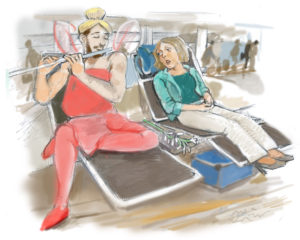
I make a mental note to consider an essay arguing that Einstein drafted his theory of Special Relativity in these corridors; I notice that as I try to pick up my pace, the carry-on I pull behind me and the laptop on my back gain mass, and the clock on my phone slows down. Yet, according to the signs, I am no closer to Concourse C than when I started out. Then, like Bilbo Baggins catching sight of the Last Homely House, I spy, just off the corridor I am tramping through, an alcove thoughtfully provided by the mad architect who designed this distended monstrosity. The alcove is furnished with a hub of what look like beach chairs set on low pedestals and upholstered in imitation leather. It is silent and empty, and the thought of being able to recline at an angle of less than seventy-five degrees is more salaciously tempting than anything else I have seen this morning. I’m an organized person and my travel philosophy is always get to my gate first, and then rest, but I have so much time that there seems to be no reason not to stop for a brief nap. So I choose a chair that faces away from the corridor, place my carry-on underneath and my backpack for a pillow, and lie down. Out of the corner of my eye, I notice, on the next chair over, the long stem and closed buds of what we call in Hebrew a shoshan tzahor. It makes no impression. I quickly lose consciousness, and when I come to, I scream.
 Haim Watzman
Haim Watzman
The Treasure Room — “Necessary Stories” from The Jerusalem Report
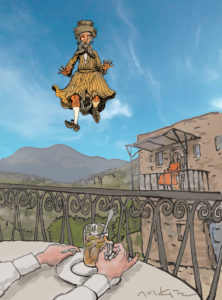 Rachel Eberlein had just languidly stirred honey into her sage tea when she spotted Rabbi Hayyim soaring down from a feathery cloud that hung over Safed and Mt. Meron. It was the only mark in an otherwise clear blue sky. While he was still far too distant for her to make out his face, she knew it was Rabbi Hayyim Vital, her tenant these last two years. Just as people have distinctive walks that make it possible to identify them from far away, so they have their own special ways of flying. Rabbi Hayyim’s path was a series of bumps; he descended a bit, his kaftan billowing and offering a glimpse of his thighs, the then lurched up, then plunged, then lurched up again, all while standing erect with his arms stiff at his sides. It was as if he did not know whether he really wanted to reach earth.
Rachel Eberlein had just languidly stirred honey into her sage tea when she spotted Rabbi Hayyim soaring down from a feathery cloud that hung over Safed and Mt. Meron. It was the only mark in an otherwise clear blue sky. While he was still far too distant for her to make out his face, she knew it was Rabbi Hayyim Vital, her tenant these last two years. Just as people have distinctive walks that make it possible to identify them from far away, so they have their own special ways of flying. Rabbi Hayyim’s path was a series of bumps; he descended a bit, his kaftan billowing and offering a glimpse of his thighs, the then lurched up, then plunged, then lurched up again, all while standing erect with his arms stiff at his sides. It was as if he did not know whether he really wanted to reach earth.
It was a week before Lag B’Omer, and the sun’s rays were still a caress rather than a hammer blow, as in the summer. The magnitude of the day—somehow that phrase from Yom Kippur came to mind, the magnitude of the day—required a woman to sit on her second floor balcony and sip tea (sage tea because her stomach had hurt this morning, even though her time of month had passed a couple days ago). God had decreed it, as evidenced by the fact that her neighbor across the courtyard, Hannah, was also sipping tea on her balcony, surveying the verdant hills that ringed the holy city. She glanced at Rachel and followed her gaze to the sky, and, Hannah was pretty sure, raised her eyebrows.
Rachel frowned. Hannah always had to stick a thorn in her side. Rabbi Hayyim was just a tenant, no more, a way for a poor widow to put bread and cheese and olives on her table. Hannah was the one who should be ashamed of herself. She was remarried now, and should not so closely observe her former husband. She did not appreciate Rabbi Hayyim’s knowledge of the deepest secrets of the Torah that had descended from heaven to the Galilean mystics in recent times, as if God were compensating his people for their exile from Spain. Rachel spoke with him sometimes about the great mission that the Holy One, Blessed be He, had charged his people with, to raise up the divine sparks captured by the shells of evil. At times he spoke quickly, with a fiery intensity; at other times he would say a single word and fall silent and take to his bed for hours. In any case, if the stories were true, Hannah’s leers were out of place. It must have been her fault, she must not have known how to care for a man. Rabbi Hayyim was small and did not eat, and while his face was handsome enough, it had several pock-marks that were clearly visible under his spotty beard. Also, he had no income. In fact, he hadn’t paid his rent for two months, a fact that Rachel reminded him of just as he lunged down from treetop height and crashed loudly beside her, falling on his bottom and crying out in pain.
The Dig at Bab al-Wad — “Necessary Stories” from The Jerusalem Report
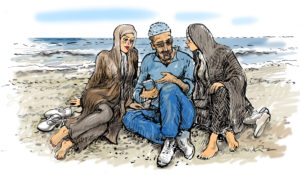
At dawn he’d set Klara and Stella to sifting through yesterday’s rubble. An hour later they came to him with an almost pristine Samsung Note 7 with no char marks; others might have tossed it out as just another iPhone. He rewarded them by telling them to take the rest of the day off on the beach, half hoping that he’d manage to slip away there himself to watch them gambol in the waves. Instead, here he was standing on the edge of Pit 3b watching Jawad, the grad student from the co-sponsoring University of Qom, brushing grit off a flat plastic torus. Jawad put his mouth close to the object to blow some dust off and grimaced.
“It’s still dirty,” Yehuda said. He considered leaping agilely into the pit as if he were Jawad’s age, but then figured it was not worth it since Klara and Stella were not watching, and he’d probably fall on his face anyway. They did seem to sit up and notice, though, when Jawad eschewed the ladder and jumped.
“That’s not dirt,” Jawad said, wiping the back of his hand on his beard. “It’s real shit.”
Yehuda fell silent.
“A clincher for your theory?” Jawad held the toilet seat up as if it were a trophy. “This is the Sha’ar Hagai gas station? Identified in that dog-eared family chronicle you lug around as having had the filthiest bathroom between Jerusalem and Tel Aviv?”
Fire — “Necessary Stories” from The Jerusalem Report
Haim Watzman
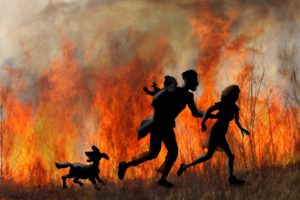
Orit races to Yoel’s room as Adam pulls on his pants and tries to think whether there are any essential papers or valuables he should stuff into the pockets of his cargoes. Another tree catches, closer to home; a carpet of flame approaches from the edge of the back lawn, along the wadi. He has a coughing fit as Orit runs back in to the room, two-year-old Yoel swaddled in a wet blanket. She pulls at Adam. Shouldn’t there be screams, shouts, from the neighbors, he wonders as he coughs. Gandhi trails them, looking back at the window, and Yoel chants “Go way fire. Bad fire!”
When they emerge from their front door, Yoel exults: “Firetruck!” They stand on a peninsula, an enclave of houses surrounded on three sides by flames. Five firemen in yellow suits are hosing the trees and gaping at them.
“What the hell!” one exclaims, dropping his grip and running over. “Where have you been? We evacuated the whole street nearly an hour ago!”
Orit hugs Yoel close. “We were sleeping. No one woke us up.” The heat was almost unbearable but Adam could feel the cold of the November ground welling up through the soles of his sandals.
Caught in the Meshwork — “Necessary Stories” from The Jerusalem Report
When Nir woke up in the dark, Heli was crying in her sleep. At the foot of the bed, Ben Ha-Ha, the cat, was crouched in defecating position, and from the balcony, outside the sliding door, a pigeon screamed. As none of these things made sense, Nir assumed he had only dreamed of waking. He turned over to his other side and, back to all the apparitions, descended to another plane of slumber.
When the alarm roused him, some time after dawn, Nir groaned, turned over, and opened his eyes. Heli was out on the balcony, looking up at the meshwork roof of the pergola they had installed just before the holidays. The balcony, which opened from their room, faced west; a last bit of night remained there. Nir groaned again and then propped himself up on his elbow.
“I feel like I didn’t sleep at all,” he grumbled. “I had this horrible …”

“Shit!”
Heli brought him toilet paper and wipes and a rag to cleanse the dirty spot on the floor. She also reminded him that she had told him not to give in to his mother’s insistence that they adopt her cat.
Nir put on t-shirt, rinsed his foot in the shower, and then tiptoed into the boys’ room. Ben Ha-Ha, a miniature panther curled up blackly in the crook of Elisha’s elbow on the lower bunk, opened phosphorescent eyes as Nir began to sing. For two minutes nothing happened, but then Omer, in the upper bunk, suddenly sat up, eyed his father with exasperation, and dove down to bury his head under his pillow. In the pale dawn Nir thought he caught the glimmer of the first faint fuzz on his older son’s upper lip. Could it be? Wasn’t it too early for that?
Peck of Pickled Pollsters — “Necessary Stories” from The Jerusalem Report
Haim Watzman

I used to try to contain his cascading consonants and viva voce vowels, but then relinquished all resistance. Frankly, I was happy that there had been a hiatus—for some four fortnights my Skype had been silent, but then belatedly on my browser, just as I was autographing my absentee ballot, his avatar aparated.
“Hey, Frank, wherya been?” I queried on my qwerty keyboard.
Post-pregnant pause, Frank formulated: “Brooding on the blight that plagues the planet.”
“As always,” I answered.
“I have been agonizing over William Butler’s legendary lyric: ‘a kind of chaos is unleashed on the universe, the blood-blinded tide is untethered.’”
“You mean Yeats?” I yammered. “But you revise his vocabulary.”
“Dare you doubt my veracity in verse?” Frank was awfully offended.
With a sad sigh I said: “Apologies, amigo. This señor is at your service.”
“I call with concern in connection with your far-off franchise.” My chum chided: “As our buddyhood began before our birth, I have grave grounds for goosebumps. Do you value your vote? Do you take your suffrage seriously?”
“Absolutely,” I affirmed. “In fact, my ballot is before me.”
Besieged — “Necessary Stories” from The Jerusalem Report
Haim Watzman

Chaya glanced at the boy in the bed. He was lying on his back, staring at the mildew on the ceiling. His sun-fired head and neck looked as if they had been grafted on to his pale body. She quickly pushed her arms into the sleeves of her smock and stood up. The smock did little to warm her and floor was icy. Now the whole door shook and the boy’s friend shouted: “Hey, you two going into overtime?”
“It’s Ari,” the boy said matter-of-factly. He stroked the line of his hairless chest with his left hand and his right moved down under the corner of the blanket that covered his loins.
She brushed her hair, stooping before a tiny mirror propped up on a rough wooden table against the wall. “Should I let him in?”
“It’s not his real name,” the boy said, turning to look at her.
“It usually isn’t,” she said. “Mine isn’t. Nor is yours.”
“You speak Hebrew so precisely. I mean, for someone who’s been here just two years,” the boy said. Then he quickly added: “I like that.”
“Get dressed and don’t forget to pay.”
A Line of Who — “Necessary Stories” from The Jerusalem Report
Dani turned his transistor on even though a gale from the north was banging on the Perspex windows of the guard post like the ghost of Keith Moon on storm-cloud percussion. The rays of the sun setting over an unseen Mediterranean occasionally broke through, outlining in deep orange the umbras of clouds lying just below and just above the nearby peak of Jebel Baruk. A ray caught the wind-ragged, frost-crusted Israeli flag as if to say that the outpost and its soldiers, so far from home, were trapped between the empyrean above and the hell of the war below. Setting the radio down on the metal ledge on which the MAG was mounted, he glanced over at Adam. Somehow, between the drumming of the sky and the drumming of the Lebanese progressive rock station, he heard that his companion for the coming six-hour shift was crying.

Adam spoke.
“What was that?” Dani shouted over the pandemonium.
“It’s against the rules. Taking off your vest.” A shrieking squall filtered out whatever emotion there might have been in Adam’s voice.
“So’s the radio,” Adam went on. “Turn it off.” And then Dani thought he heard a choking sound, although he couldn’t be sure.
At Hormah
Haim Watzman
Thoughts on Devarim, this week’s Torah portion, in memory of my father and teacher Sanford “Whitey” Watzman, who left us two years ago on 2 Av. This is an English version of the original Hebrew essay, published in Shabbat Shalom, the weekly Torah portion sheet published by Oz VeShalom/Netivot Shalom. The original Hebrew version can be read here .
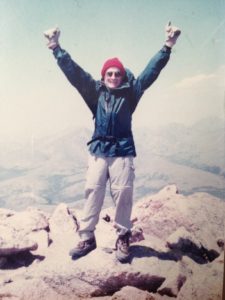 There once was a city, somewhere in the Negev, whose name went down in biblical history as the site of a painful defeat for the children of Israel. The rout at Hormah took place in a war against the Canaanite nations, which followed the sin of the spies. For that sin, the Children of Israel were punished—their entry into the Promised Land was delayed by a generation. Their crime was the lack of faith displayed by the generation that left Egypt, their reluctance to fight the war that awaited them when they crossed from the wilderness into Canaan. The failure of conviction began at the leadership level, among ten of the twelve spies sent to scout the land, and quickly spread to the entire nation.
There once was a city, somewhere in the Negev, whose name went down in biblical history as the site of a painful defeat for the children of Israel. The rout at Hormah took place in a war against the Canaanite nations, which followed the sin of the spies. For that sin, the Children of Israel were punished—their entry into the Promised Land was delayed by a generation. Their crime was the lack of faith displayed by the generation that left Egypt, their reluctance to fight the war that awaited them when they crossed from the wilderness into Canaan. The failure of conviction began at the leadership level, among ten of the twelve spies sent to scout the land, and quickly spread to the entire nation.
But the war fought at Hormah did not come in retribution for the sin of the spies. It was imposed subsequent to that sin and its punishment. After comprehending how grave and error they had made, a vanguard of the people to take the initiative to correct it. The Ma’apilim, meaning “the scalers [of the heights],” now understood that it was God’s will that the Israelites fight bravely against the Canaanite nations. They organized to take determined action, as Moses relates in this week’s Torah portion (Deut. 1:41): “We stand guilty before the LORD. We will go up now and fight, just as the LORD our God commanded us.” The call to arms grew out of profound remorse for the sin and a real desire to atone for it. But instead of accepting the heroism and good intentions of the Ma’apilim, God condemned them and meted out another heavy punishment, in addition to that of the sin of the spies: “Then the Amorites who lived in those hills came out against you like so many bees and chased you, and they crushed you at Hormah in Seir.” It is easy to imagine the shattered and bloodied survivors asking themselves: “What does God want with us? When we said we were scared of conquering the land, we were sentenced to die in the desert, and when we fervently set out to conquer the land, we died at Hormah.”
The Outpost on Oliphant Street — “Necessary Stories” from The Jerusalem Report
Haim Watzman

Udi took a squad into Talbiyeh. A lot of the rich Arabs who lived there had already packed up and gone. The National Guard, what did they call it, no, it’ll come to me, the Hars Watani that the mufti sent into action, had moved into the neighborhood. The British, who had security zones on either side, let them in. It was going to turn into a staging ground for an invasion of Rehavia, so we had to act.
The squad went in to show the flag, establish a presence. The thinking was that the Arab guards would get scared and turn tail the minute they saw we were coming in. There were two Arabs, little more than kids, who looked suspicious, that’s what Udi told me afterward. Udi called them over, demanded that they identify themselves. Instead they pulled out pistols and began shooting. Two of Udi’s men were wounded and he beat a retreat.
Of course, we weren’t going to take that lying down.
Lerner in the Mirror — “Necessary Stories” from The Jerusalem Report
Haim Watzman

“America is lucky,” he says as he smooths his hair and slaps his cheeks lightly. “To have Trump, I mean.”
But maybe I’m wrong. Bashan’s reverse image moves into my field of view just as I offer a weak smile and start on the stubble on the left side of my face.
“Right.” Bashan grimaces at his reflection. Where Lerner is steely, he is malleable; where Lerner has angles, he has arcs. A lot less hair, too, on his head, that is. Still, he must have been a looker back in the 1948 war, when they conquered the Negev together. Bashan had been a platoon commander in the Palmach’s Yiftah Brigade and Lerner one of his soldiers. I’d heard about it time and again in the shower.
“In our day,” Lerner’s reflection says as it adjusts the shoulders of its backward t-shirt, “the world had strong leaders who stood up for their countries. Churchill. De Gaulle. Roosevelt. Ben-Gurion.”
Bashan’s reflection leans forward at me and wiped a grain from its eye. “The Old Man.”
The Plowman Meets the Reaper — “Necessary Stories” from The Jerusalem Report
Haim Watzman, seen on CAHI.org

Behold, days are coming, says the Lord, when the plowman shall overtake the reaper, and the treader of grapes him who sows seed … And I will bring back the captivity of my people of Israel, and they shall build the waste cities, and inhabit them; they shall also make gardens, and eat their fruit. (Amos 9:13–14)
He knew her, she lived past the sands, in the part of Rassco where you heard German and the Philharmonic when the windows were open. He sometimes went to play soccer on the street there when he needed to get away from home. Her house, one of the tiny two-room cubicles that made up the neighborhood, had a small garden that looked as if she went out every morning to straighten and polish each leaf and petal. He’d often see her sitting on her front stoop with one or another lady friend, both in high heels, in long sleeves even on the hottest days of the summer. Sometimes she would have brushes in hand and an easel in front of her, painting scenes of a city that looked nothing like Holon.
Once he passed by and she wasn’t outside and he felt so disappointed that he threw a stone at her window and then hid to see if she would come out. When she did, a frown on her face, he felt so ashamed of himself that he avoided passing her house for the next month.
She had been on the early train to Jerusalem and here she was again, a straw hat with a flower over her bobbed blonde hair. The train was crowded and hot but he’d manage to squeeze through to get a window seat. She was already on the aisle. In the morning she had sat down right next to him, fanning herself with a twice-folded copy of Ha’aretz. When she looked at him he was afraid she knew that he had thrown the stone, but she just smiled and asked his name and age in a throaty Ashkenazi kind of voice and then said that her name was Alma and that it was very brave for a boy of eleven to take the train to Jerusalem by himself and was someone meeting him at the station in Jerusalem. He told her that his name was Amos and that his father had sent him to bring his mother home before the war began.





